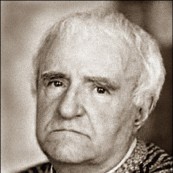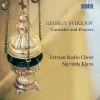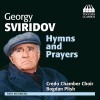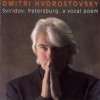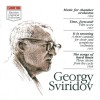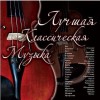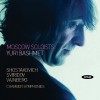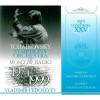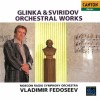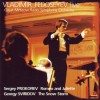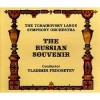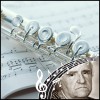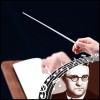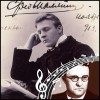Composers
Early Life and Youth
Sviridov was born in 1915 in the town of Fatezh in the Kursk guberniya of the Russian Empire (present-day Kursk Oblast). His father, Vasily Sviridov, a sympathizer of the Bolshevik cause during the Russian Civil War that followed the Russian Revolution, was killed when Georgy was four. The family moved to Kursk, where Sviridov, still in elementary school, learned to play his first instrument, the balalaika. Learning to play by ear, he demonstrated such talent and ability that he was accepted into the local orchestra of Russian folk instruments. He enrolled in a music school in 1929, and following the advice of his teacher, M. Krutinsky, came to Leningrad in 1932, where he studied piano at the Leningrad Central Music College, graduating in 1936. From 1936 to 1941, Sviridov studied at the Leningrad Conservatory under Peter Borisovich Ryazanov and Dmitri Shostakovich. Mobilized into the Soviet armed forces in 1941, just days after his graduation from the conservatory, Sviridov was sent to a military academy in Ufa, but was discharged by the end of the year due to poor health.
Musical legacy
In 1935 Sviridov's composed a cycle of lyrical romances based on the poetry of Alexander Pushkin which brought him first critical acclaim. During his studies in Leningrad Conservatory, 1936 – 1941, Sviridov experimented with different genres and different types of musical composition. He completed Piano Concerto No. 1 (1936 – 1939), Symphony No. 1 and the Chamber Symphony for Strings (1940). Later Sviridov would turn to the rich Russian musical heritage, including the folk songs, for inspiration.
Among Sviridov's most popular orchestral pieces are the Romance and the Waltz from his The Blizzard, musical illustrations after Pushkin (1975), that were originally written for the eponymous 1964 film based on the short story from Pushkin's The Tales of the Late Ivan Petrovich Belkin. A short segment from his score for the 1967 film Time, Forward! (Время, вперёд!) was selected as the opening theme for the main evening TV news program Vremya (Время, 'time') and became the staple of Soviet life for several generations.
Poetry always occupied an important place in Sviridov's artistic universe. He wrote songs and romances to the lyrics of Mikhail Lermontov (1938, 1957), Alexander Blok (1941), William Shakespeare (1944 – 1960), Robert Burns (in Russian translation, 1955). Despite the popularity of Sviridov's instrumental works, both the composer himself and the music critics regarded vocal and choral music to be his main strengths. Pathetic Oratorio (1959) after Vladimir Mayakovsky has been called a masterful musical rendering of one of the most popular Soviet poets. Sviridov's prolific vocal chamber and vocal symphonic output includes Oratorio To the memory of Sergei Yesenin (1956), Little Cantata Wooden Russia (1964) after Yesenin, Cantata Songs of Kursk (1964), Spring Cantata (1972) after Nikolai Nekrasov, songs, romances, and cantatas after Fyodor Tyutchev, Sergei Yesenin, Alexander Blok, Boris Pasternak, Alexander Prokofiev, Robert Rozhdestvensky. He also wrote one opera, Twinkling Lights (1951).
While Sviridov's music remains little known in the West, his works received high praise in his homeland for their memorable lyrical melodies and national flavor.
Honors and Awards
In 1946 Sviridov was awarded the State Stalin Prize for his Piano Trio, heavily influenced by Tchaikovsky. Lenin Prize of 1960 was bestowed on the composer for his Pathetic Oratorio. Georgy Sviridov was awarded the USSR State Prize in 1968 and 1980 and honored with the title People's Artist of the USSR. He became a Hero of Socialist Labor (1975) and was twice awarded the Order of Lenin.
Asteroid 4075 Sviridov, discovered by the Russian astronomer Lyudmila Georgievna Karachkina in 1982, was named in honor of Georgy Sviridov.
Death
The composer died of a heart attack in Moscow, where he had lived since 1956, on January 5, 1998.
Recently Added
Biography
Early Life and Youth
Sviridov was born in 1915 in the town of Fatezh in the Kursk guberniya of the Russian Empire (present-day Kursk Oblast). His father, Vasily Sviridov, a sympathizer of the Bolshevik cause during the Russian Civil War that followed the Russian Revolution, was killed when Georgy was four. The family moved to Kursk, where Sviridov, still in elementary school, learned to play his first instrument, the balalaika. Learning to play by ear, he demonstrated such talent and ability that he was accepted into the local orchestra of Russian folk instruments. He enrolled in a music school in 1929, and following the advice of his teacher, M. Krutinsky, came to Leningrad in 1932, where he studied piano at the Leningrad Central Music College, graduating in 1936. From 1936 to 1941, Sviridov studied at the Leningrad Conservatory under Peter Borisovich Ryazanov and Dmitri Shostakovich. Mobilized into the Soviet armed forces in 1941, just days after his graduation from the conservatory, Sviridov was sent to a military academy in Ufa, but was discharged by the end of the year due to poor health.
Musical legacy
In 1935 Sviridov's composed a cycle of lyrical romances based on the poetry of Alexander Pushkin which brought him first critical acclaim. During his studies in Leningrad Conservatory, 1936 – 1941, Sviridov experimented with different genres and different types of musical composition. He completed Piano Concerto No. 1 (1936 – 1939), Symphony No. 1 and the Chamber Symphony for Strings (1940). Later Sviridov would turn to the rich Russian musical heritage, including the folk songs, for inspiration.
Among Sviridov's most popular orchestral pieces are the Romance and the Waltz from his The Blizzard, musical illustrations after Pushkin (1975), that were originally written for the eponymous 1964 film based on the short story from Pushkin's The Tales of the Late Ivan Petrovich Belkin. A short segment from his score for the 1967 film Time, Forward! (Время, вперёд!) was selected as the opening theme for the main evening TV news program Vremya (Время, 'time') and became the staple of Soviet life for several generations.
Poetry always occupied an important place in Sviridov's artistic universe. He wrote songs and romances to the lyrics of Mikhail Lermontov (1938, 1957), Alexander Blok (1941), William Shakespeare (1944 – 1960), Robert Burns (in Russian translation, 1955). Despite the popularity of Sviridov's instrumental works, both the composer himself and the music critics regarded vocal and choral music to be his main strengths. Pathetic Oratorio (1959) after Vladimir Mayakovsky has been called a masterful musical rendering of one of the most popular Soviet poets. Sviridov's prolific vocal chamber and vocal symphonic output includes Oratorio To the memory of Sergei Yesenin (1956), Little Cantata Wooden Russia (1964) after Yesenin, Cantata Songs of Kursk (1964), Spring Cantata (1972) after Nikolai Nekrasov, songs, romances, and cantatas after Fyodor Tyutchev, Sergei Yesenin, Alexander Blok, Boris Pasternak, Alexander Prokofiev, Robert Rozhdestvensky. He also wrote one opera, Twinkling Lights (1951).
While Sviridov's music remains little known in the West, his works received high praise in his homeland for their memorable lyrical melodies and national flavor.
Honors and Awards
In 1946 Sviridov was awarded the State Stalin Prize for his Piano Trio, heavily influenced by Tchaikovsky. Lenin Prize of 1960 was bestowed on the composer for his Pathetic Oratorio. Georgy Sviridov was awarded the USSR State Prize in 1968 and 1980 and honored with the title People's Artist of the USSR. He became a Hero of Socialist Labor (1975) and was twice awarded the Order of Lenin.
Asteroid 4075 Sviridov, discovered by the Russian astronomer Lyudmila Georgievna Karachkina in 1982, was named in honor of Georgy Sviridov.
Death
The composer died of a heart attack in Moscow, where he had lived since 1956, on January 5, 1998.
